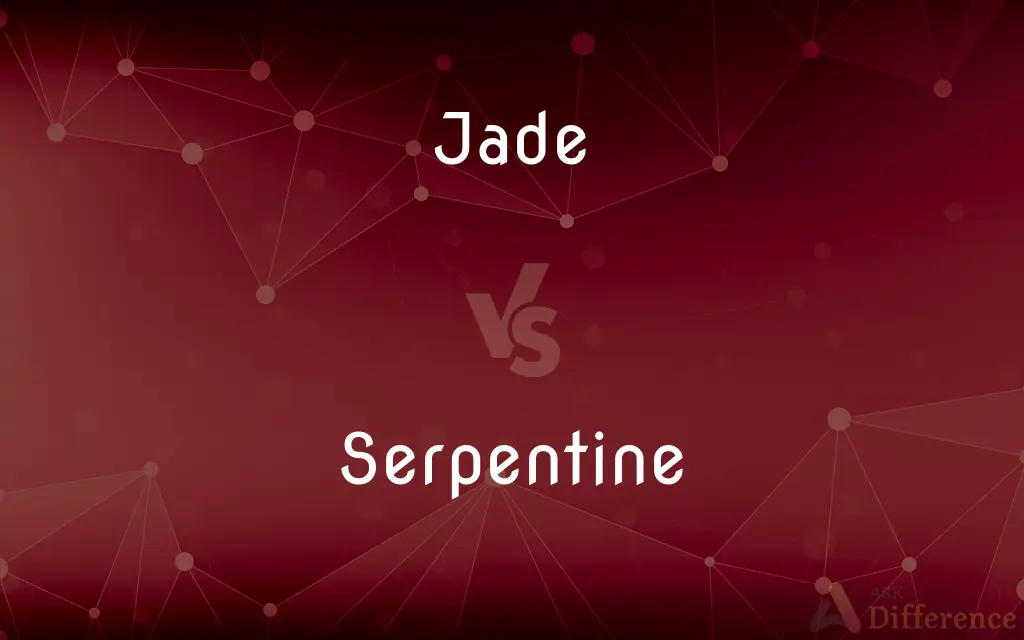Jade vs. Serpentine — What's the Difference?
By Urooj Arif & Maham Liaqat — Published on March 1, 2024
Jade refers to two minerals, nephrite and jadeite, known for their toughness and beauty in jewelry, while serpentine is a group of minerals used for decorative objects and architectural purposes, distinct in composition and appearance.

Difference Between Jade and Serpentine
Table of Contents
ADVERTISEMENT
Key Differences
Jade encompasses nephrite and jadeite, both prized in art and jewelry for their aesthetic appeal and durability. Nephrite typically appears in creamy white to green colors, while jadeite can be found in a wider range of colors, including green, lavender, and blue. Serpentine, on the other hand, refers to a group of related minerals that are often green and used for carving, decoration, and building materials. Its appearance can vary significantly, often showcasing a greasy luster and snake-like patterns, hence its name.
Historically, jade has been highly valued in many cultures, especially in East Asia, for its beauty and supposed protective qualities. It's often used in intricate carvings, jewelry, and ceremonial objects. Serpentine, while also used for decorative and architectural purposes, does not hold the same cultural significance but is appreciated for its unique beauty and is sometimes used as a jade imitation due to its similar appearance.
On the Mohs scale of mineral hardness, jade (both nephrite and jadeite) is notably tough, making it a preferred material for both ornamental and practical items. Nephrite ranges from about 6 to 6.5, while jadeite is slightly harder, ranging from about 6.5 to 7. Serpentine is generally softer, with hardness ratings typically between 3 and 6, depending on the specific variety, making it less suitable for applications requiring high durability.
The chemical compositions of jade and serpentine also differ. Nephrite consists of a calcium magnesium iron silicate, while jadeite contains sodium and aluminum. Serpentine minerals are primarily composed of hydrated magnesium silicate, often with the presence of asbestos, which can pose health risks when inhaled as dust.
Despite these differences, both jade and serpentine have been used throughout history for their beauty and utility. Jade remains more highly valued and sought after in the gemstone market, while serpentine offers an accessible alternative with its own unique appeal and applications in the decorative arts and architecture.
ADVERTISEMENT
Comparison Chart
Composition
Nephrite or jadeite
Group of minerals, mainly magnesium silicate
Hardness
6-7 on Mohs scale
3-6 on Mohs scale
Cultural Significance
High, with historical and art value
Lower, less historically prized
Use
Jewelry, carvings, tools
Decorative objects, low-durability items
Price
Generally high, especially for jadeite
More affordable
Availability
Less common, nephrite more so than jadeite
More common
Color Range
Green, white, yellow, among others
Primarily green, with variations
Durability
Suitable for intricate carving and jewelry
Softer, prone to scratching
Market Value
High for quality pieces
Lower, considered less valuable
Compare with Definitions
Jade
A precious stone used in jewelry and art.
The necklace was adorned with a stunning piece of green jade.
Serpentine
A group of minerals used in decoration and architecture.
The serpentine stone was used to create a smooth, polished countertop.
Jade
Historically significant in many cultures.
Ancient Chinese emperors valued jade above all other gems.
Serpentine
Known for its green color and waxy luster.
The serpentine rock's green hue complemented the garden's design.
Jade
More expensive and valuable.
The jadeite bangle sold for thousands at the auction.
Serpentine
Softer and more prone to wear.
The serpentine carving required careful handling due to its softness.
Jade
Often associated with purity and morality.
Jade is considered a symbol of purity in many cultures.
Serpentine
More accessible and affordable.
They opted for serpentine for the project to stay within budget.
Jade
Known for its toughness and variety of colors.
They chose jade for the sculpture because of its durability.
Serpentine
Used in healing and spiritual practices.
Serpentine stones are often used in meditation for their healing properties.
Jade
Either of two distinct minerals, nephrite and jadeite, that are generally pale green or white and are used mainly as gemstones or in carving.
Serpentine
Of or resembling a serpent, as in form or movement; sinuous.
Jade
A carving made of jade.
Serpentine
Subtly sly and tempting.
Jade
A semiprecious stone, either nephrite or jadeite, generally green or white in color, often used for carving figurines.
Serpentine
Relating to or associated with serpentinite or soil derived from it.
Jade
A stone, commonly of a pale to dark green color but sometimes whitish. It is very hard and compact, capable of fine polish, and is used for ornamental purposes and for implements, esp. in Eastern countries and among many early peoples.
Serpentine
Any of a group of greenish, brownish, or mottled minerals, Mg3Si2O5(OH)4, including chrysotile, a variety of asbestos.
Jade
A semiprecious gemstone that takes a high polish; is usually green but sometimes whitish; consists of jadeite or nephrite
Serpentine
(mineralogy) Any of several green/brown minerals consisting of magnesium and iron silicates that have similar layered crystal structure, whose appearance somewhat resembles a snake's skin.
Jade
Similar to the color of jade; especially varying from bluish green to yellowish green
Serpentine
Resembling a serpent; having the shape or qualities of a serpent; subtle; winding or turning one way and the other, like a moving serpent; anfractuous; meandering; sinuous; zigzag; as, serpentine braid.
Thy shapeLike his, and color serpentine.
Serpentine
A mineral or rock consisting chiefly of the hydrous silicate of magnesia. It is usually of an obscure green color, often with a spotted or mottled appearance resembling a serpent's skin. Precious, or noble, serpentine is translucent and of a rich oil-green color.
Common Curiosities
Why is jade more expensive than serpentine?
Jade's higher cost is due to its rarity, cultural significance, and the high demand in markets, especially in Asia, where it is particularly prized.
Is serpentine considered a semi-precious stone?
Serpentine is sometimes classified as a semi-precious stone, particularly when it is used in jewelry or decorative objects, despite its lower hardness and value compared to jade.
How can you tell the difference between jade and serpentine?
The differences can often be discerned through hardness tests, color nuances, and the stone's luster, with jade being harder and serpentine typically having a softer, sometimes oily feel.
What are the practical uses of serpentine?
Serpentine has been used in architectural applications, such as decorative stone, tiles, and countertops, as well as in carvings and ornamental objects.
Can serpentine be used as a substitute for jade?
Yes, serpentine is often used as an affordable substitute for jade, especially in decorative items, though it lacks the same hardness and cultural value.
Why is jadeite more valuable than nephrite?
Jadeite is considered more valuable than nephrite due to its richer colors, greater translucency, and rarity, making it more desirable for fine jewelry and art.
Are there any health risks associated with serpentine?
Some forms of serpentine may contain asbestos, which can pose health risks if the fibers are inhaled. However, not all serpentine varieties are hazardous, and those used in consumer goods are generally considered safe.
What are the healing properties attributed to jade?
Jade is believed to have healing properties that promote wisdom, balance, and peace, making it a favored stone in various healing practices.
What is the cultural significance of jade in China?
In China, jade has been revered for thousands of years as a symbol of purity, beauty, longevity, and status, deeply embedded in Chinese art, religion, and philosophy.
Can jade come in colors other than green?
Yes, jade, especially jadeite, can come in a variety of colors, including white, lavender, orange, and black, though green is the most well-known and sought after.
Is it easy to care for jade jewelry?
Jade jewelry requires some care to maintain its beauty, including protecting it from scratches and avoiding exposure to chemicals, but its toughness makes it relatively easy to care for compared to softer stones.
What makes serpentine popular despite being less valuable than jade?
Its affordability, unique aesthetic qualities, and versatility in various applications make serpentine a popular choice for those seeking a natural stone with a similar appearance to jade.
How is jade tested for authenticity?
Authenticity tests for jade may include specific gravity tests, scratch tests, and examination by a gemologist with specialized equipment to distinguish it from similar stones like serpentine.
Do both jade and serpentine require special care when used in jewelry?
Yes, both stones require care to maintain their appearance and longevity, with jade needing protection from harsh chemicals and impacts, while serpentine should be kept away from acids and prolonged water exposure due to its softer nature.
Can serpentine be enhanced or treated?
Like many gemstones, serpentine can be treated or enhanced to improve its appearance, including waxing or oiling to increase its luster.
Share Your Discovery

Previous Comparison
Hopefully vs. I hope so
Next Comparison
Casting Rod vs. Spinning RodAuthor Spotlight
Written by
Urooj ArifUrooj is a skilled content writer at Ask Difference, known for her exceptional ability to simplify complex topics into engaging and informative content. With a passion for research and a flair for clear, concise writing, she consistently delivers articles that resonate with our diverse audience.
Co-written by
Maham Liaqat













































